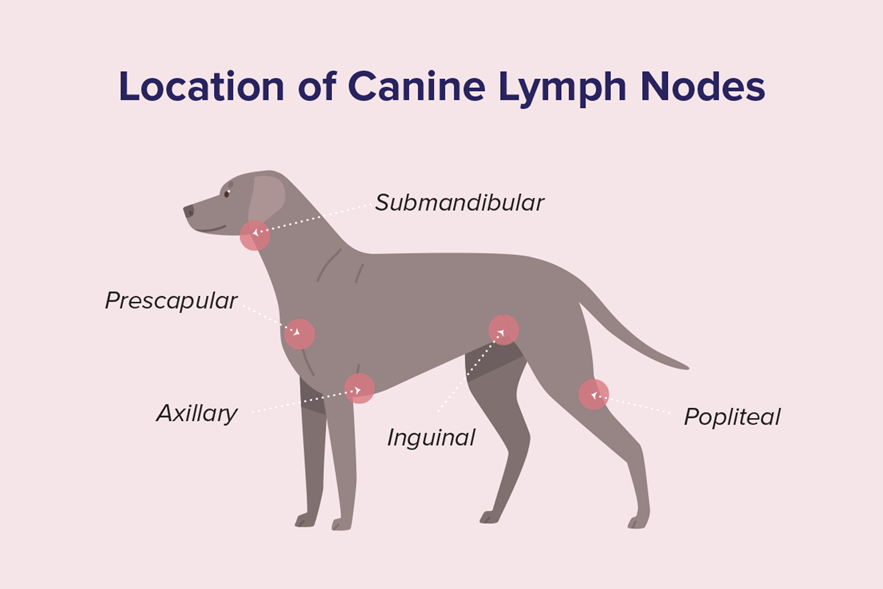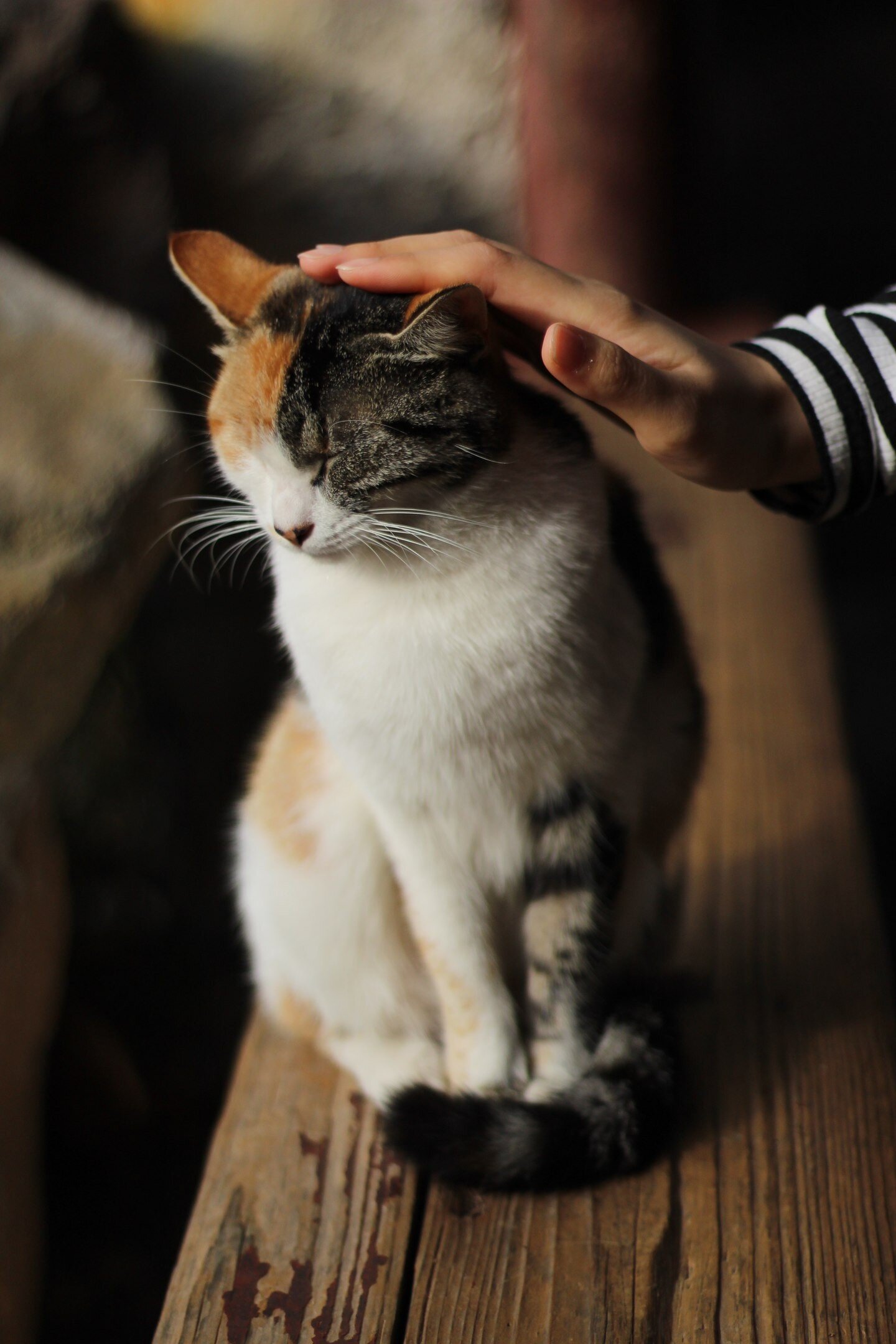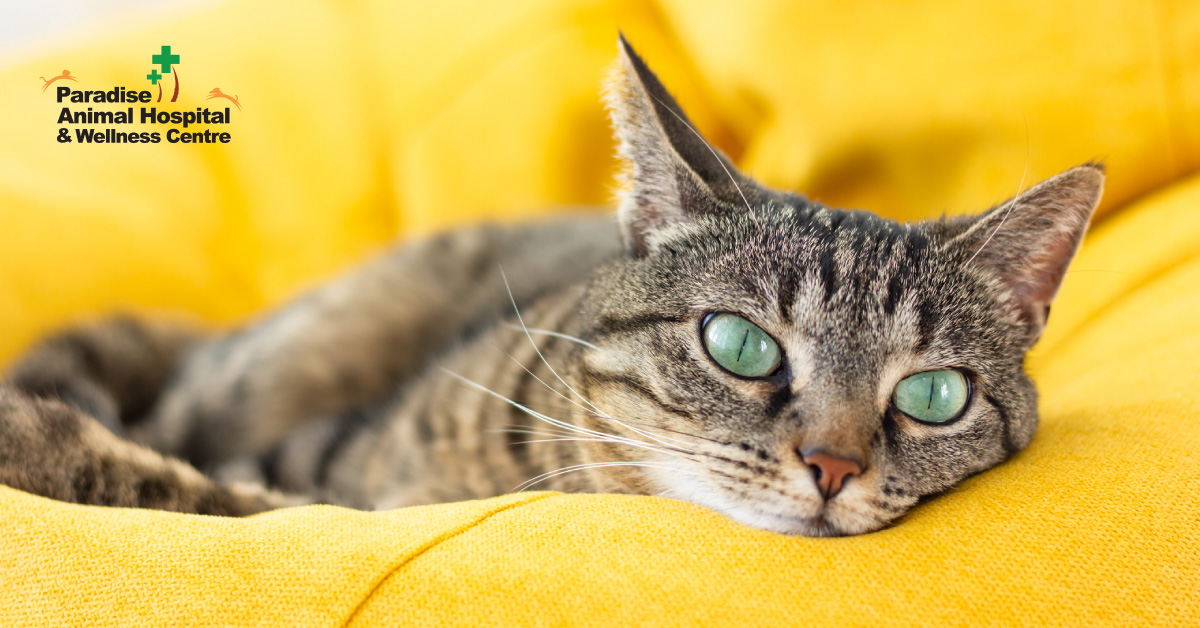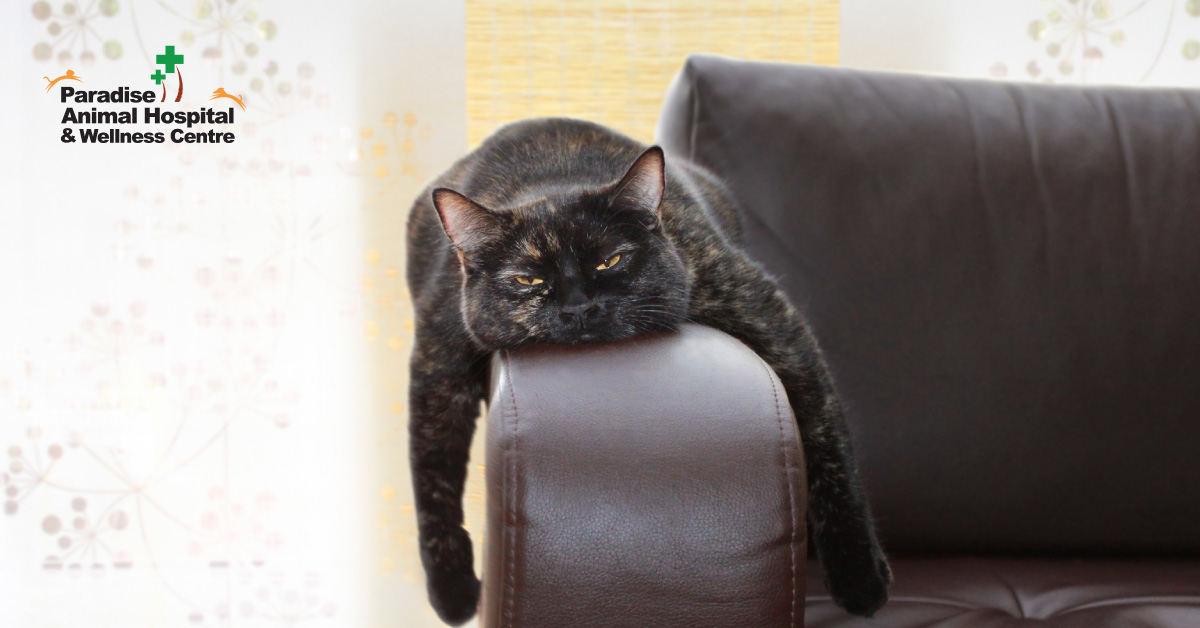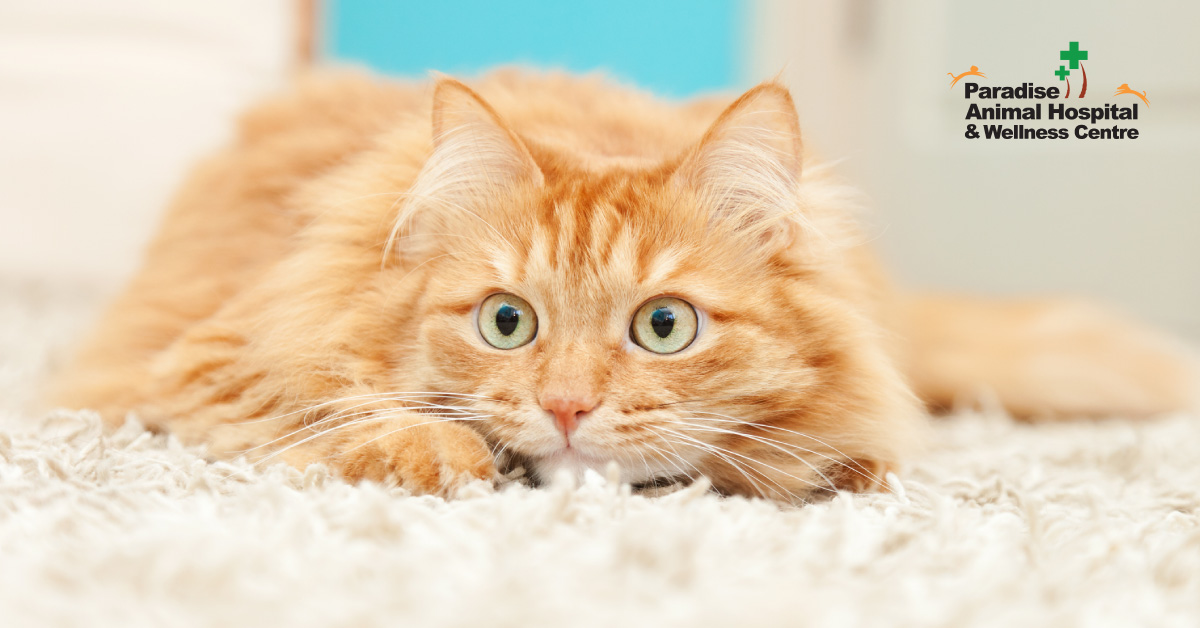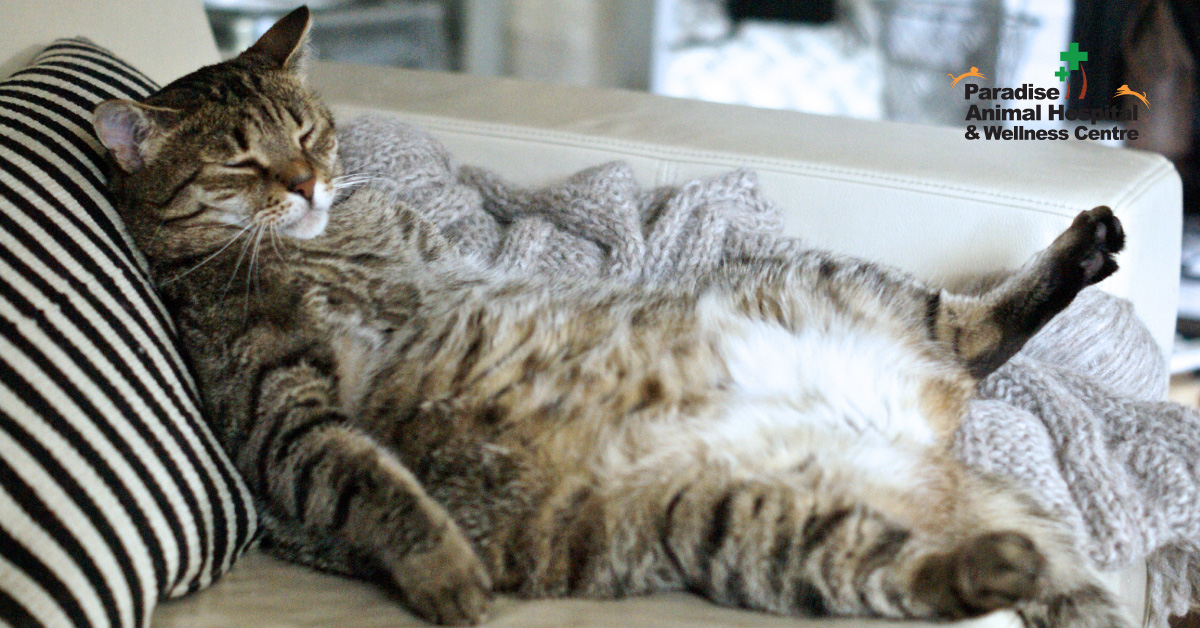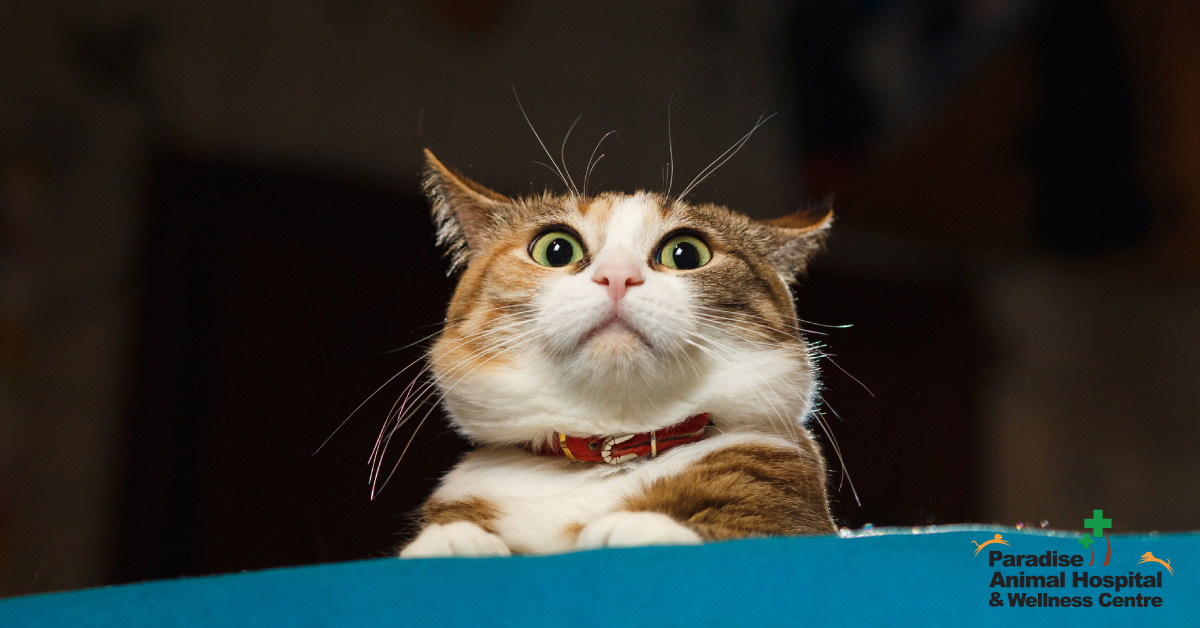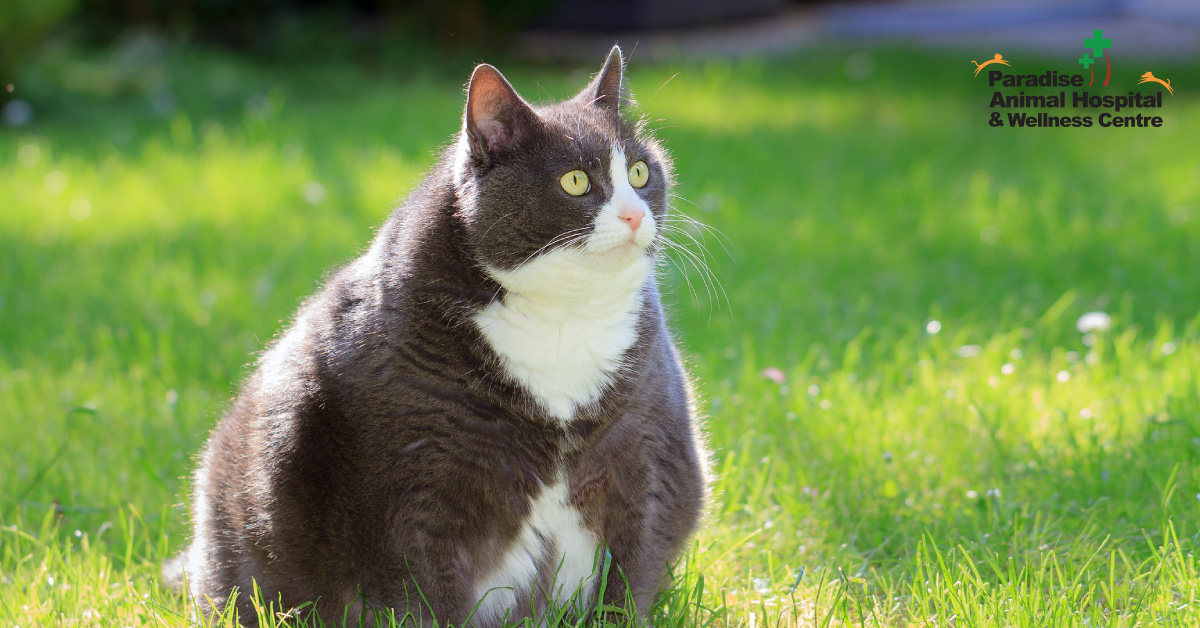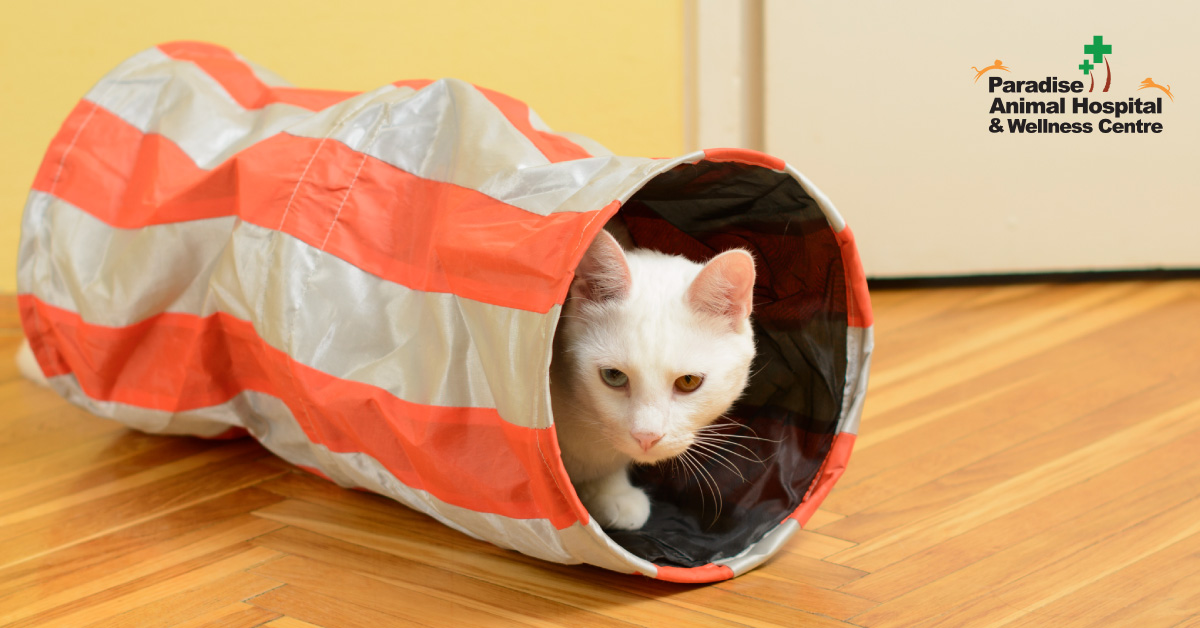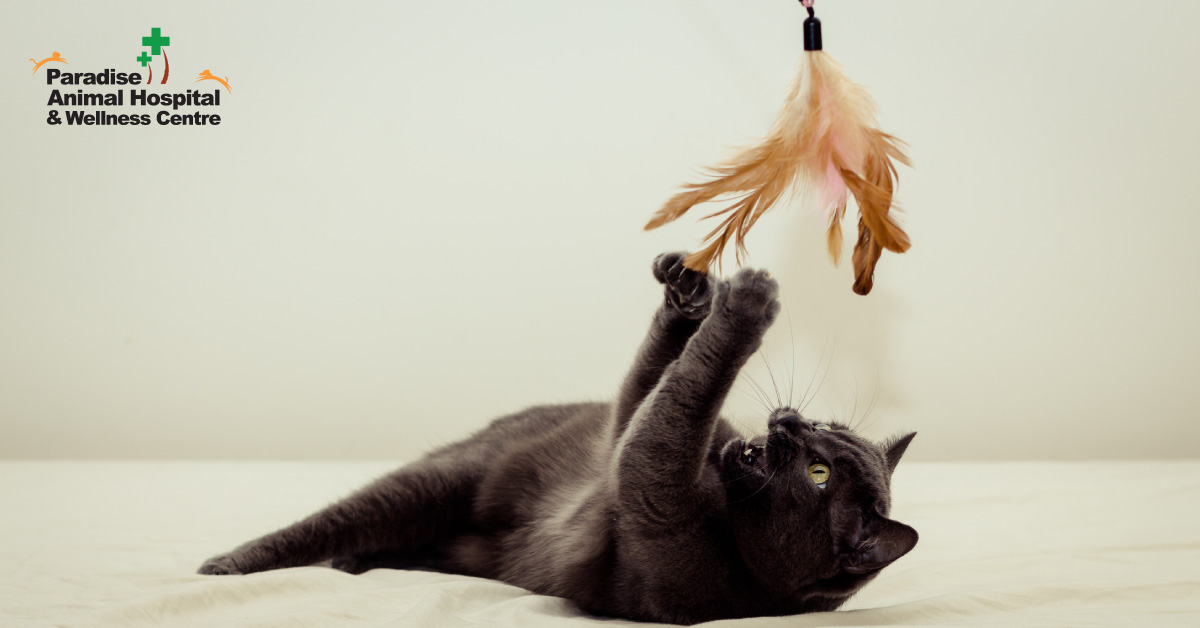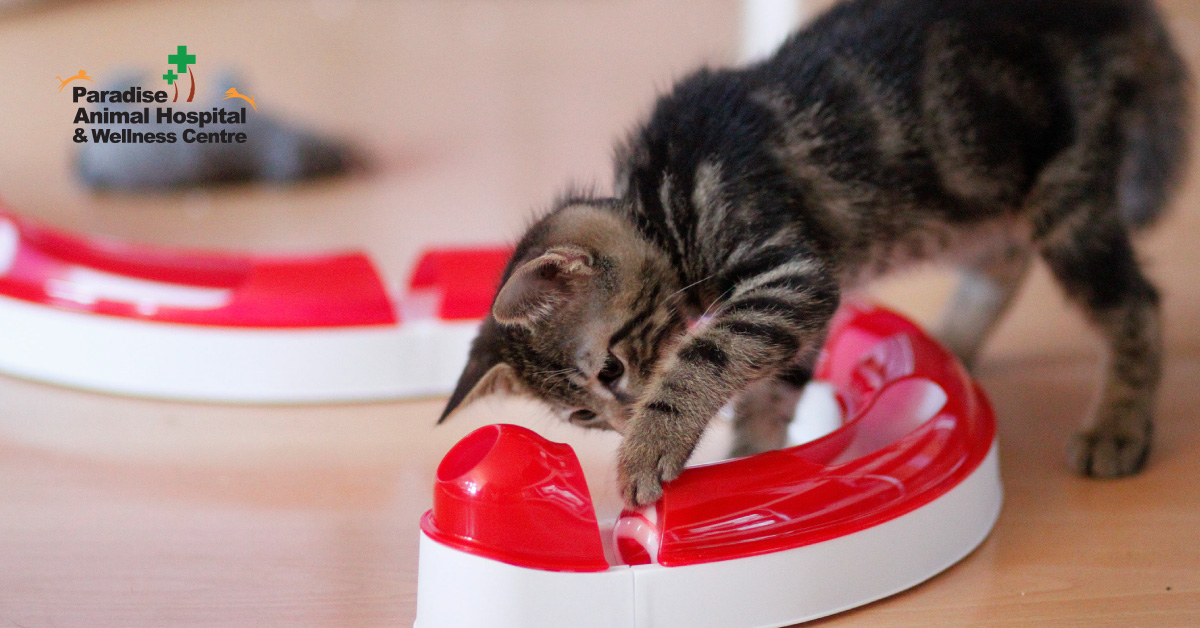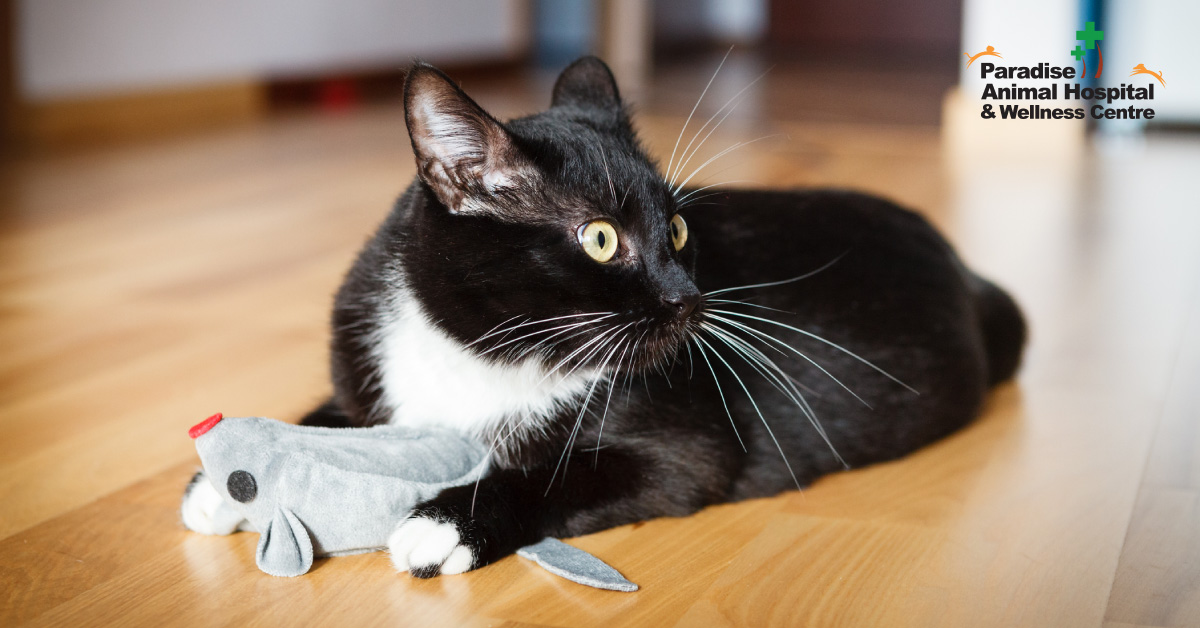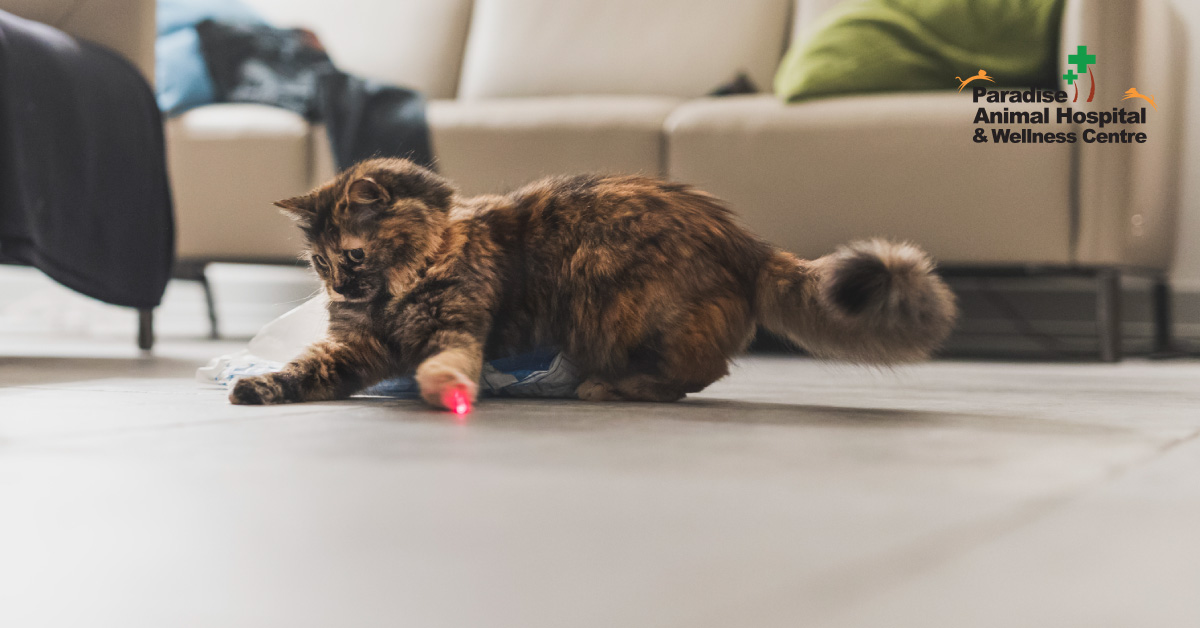May is Pet Cancer Awareness Month which intends to spread awareness and help pet owners recognize the signs and symptoms that may indicate cancer in their furry friends.
Read moreThe benefits to laser therapy
Here at PAH, we are fortunate to be able to provide laser therapy to our patients. Just like humans, animals benefit greatly from receiving laser therapy. You may ask… what does the laser do? The laser draws blood flow to the area in question, therefore promoting growth and regeneration of new cells to the area.
Read moreCatproof the Holidays
With all the hustle and bustle of holiday preparations and the excitement it brings, it also can bring a lot of stress to our cats. The holiday season brings many changes in their environment - from the decorations and lights, to increased house guests and noise - our cats can easily get ignored and frightened. While some of our precious felines are used to the everyday activities that the holidays bring, other cats may get over stimulated with all the festivities. Stressed and anxious cats may start to display undesirable behaviors such as:
scratching furniture,
house soiling,
vocalizing,
aggression
or hiding away.
But, It doesn’t have to be this way!
No one wants to deal with an emergency vet visit especially during the holidays, so I’ve prepared a list of a few things to keep in mind to help cat proof your holidays to avoid a holiday emergency.
How to avoid a Holiday Cat-tastrophe!!
Plants:
Cats love to chew, lick and claw at plants. Period.
Poinsettias, holly and mistletoes can be very toxic to cats if ingested, so consider swapping real plants for fake ones during the holidays. If you suspect that your pet has ingested a toxic plant, please take the following steps to ensure you are prioritizing your cat’s health:
identify which plant,
how much was ingested,
contact your regular veterinarian to inform them
and watch for any vomiting/diarrhea.
Some plants can be a GI irritant while others can affect your cat’s organs and cause damage which can become fatal.
Lights/wires:
All the twinkling Christmas lights can capture a curious kitten’s attention and they will love to play around with the dangling cords. Try a natural bitter spray like bitter apple to coat the wires so that your cats will leave them alone and not chew them, thus reducing the risk of getting a serious shock!
Ribbons/tinsel:
Ribbons, bows and tinsel may look like a nice addition to presents and on your Christmas tree, but they can be a major hazard to our pets. If they are ingested it can get wrapped around your cat's internal organs and intestines causing a blockage and could result in a medical emergency.
Houseguests:
The holidays can get quite busy and chaotic at times with lots of family and friends visiting. Make sure to give your cats a safe space they can go to in the home to get away from all the noise and business. Set up a room where they can come and go as they please for some quiet time away from the crowds of people.
Christmas Trees/Glass Ornaments:
Cats and Christmas trees sometimes don't go together as well as we would like. Some cats will see the Christmas tree as a big cat post just for them, playing with all the dangling ornaments and climbing through the branches. Glass ornaments can fall and break posing a hazard for tiny kitty toe beans. Make sure that your tree is also anchored well, as a mischievous kitty can easily knock it over and could injure themselves in the process.
If you have a real tree, make sure to sweep up any needles that may fall as they can be sharp and cause issues if ingested by pets, as well keep tree water covered so that pets can't drink from it and get sick.
Candles:
Flickering candles can attract the attention of curious kittens, they may burn themselves or knock them over causing a bigger disaster. Try using battery operated lights to help keep everyone safe.
Food:
The holiday celebrations also bring lots of yummy food to feast on. Remember to keep your pets in a separate room so that they cannot steal or sneak anything off counters or tables. Alcohol and chocolate is very toxic to cats and can make them quite ill, sometimes can be fatal.
How to include your pet in the holidays:
Include them in family photos, if they don't get stressed out by being held for the photos.
Include them in the presents, buy them some new mice, treats or other toys that they enjoy.
Spend some special time aside from all the festivities to bond with them if they enjoy the attention.
Take kitty shopping by enjoying a nice cup of hot cocoa, sit back in your cozy pj’s and invite your cats to join you in your lap while you do some online shopping.
Have a safe and Meowy Christmas!!!
Confessions of a Cat Lady
Anxiety and your Cat: What you need to know
Every person has dealt with a form of anxiety at some point in their lives. Animals can certainly suffer from anxiety as well.
The term “Scared’y cat” is used when someone is afraid or anxious about a situation, comparing them to a nervous cat. Cats can be anxious and afraid of many things, loud noises, fireworks, even certain changes in their environment as they are such routine animals, they can be fearful or anxious over certain people or other pets. Cat’s cannot express their feelings by talking so they will show certain signs and symptoms of anxiety through their behaviors and often prolonged stress and anxiety can cause develop into destructive behaviors and other serious illnesses.
What are the signs of stress and anxiety in cats?
Furniture scratching
Destructive behaviors
Excessive grooming
Sudden behavior changes
Less social
Hiding
Aggression
Growling and hissing
Inappropriate elimination
Vo/di
Increased or decreased appetite
Vocalizing
Depression
If your cat is showing any of the above signs and symptoms, schedule an appointment with your Veterinarian to rule out any serious medical issues. If think your cat is suffering with anxiety, your Veterinarian will perform a physical examination to discuss your cat’s emotional well-being and see how you can help your cat live a better life.
What are the causes of anxiety in cats?
Cats are routine animals and any sudden changes can cause them stress and lead to negative effects on their health and happiness. Some of these stressors can include:
Veterinary visits- It’s a well-known fact that cat’s do not typically enjoy going to the vet and it can be a stressful experience for both owners and kitty.
Start at home with getting into the carrier and going outside of their safe comfort zone. Then traveling in the car is often quite stressful and then all the sights, sounds and smells of the veterinary office can bring on fear, anxiety and stress for our feline friends.
Next time you book an appointment for your kitty try planning before your visit.
Don’t hide the carrier away, have it out so that it is familiar in their environment and they are ok with even using it as a bed and is a safe place for t hem.
Try spraying a blanket or towel with a calming pheromone spray, prior to placing kitty into the kennel.
When ready for transport try placing a blanket over your kennel and during transport always support the kennel from the bottom so that its less motion for your pet.
Place kennel safely behind the passenger's seat in the floor for more stability.
Remember no loud music, try playing some soft music to help calm your pet.
When you get to the vet office have them seat you in a cat only section or a cat only room upon arrival.
If your clinic is fear free the room will already have a blanket with calming pheromones prepared for your kitty to help decrease stress for them.
If your kitty is very reactive and stressed at the vet, they will discuss giving some anti-anxiety medication prior to bringing your cat in to give them the best positive visit possible.
Changes in environment: New family members (human or animal) can cause stress for many cats. Start with slow introductions to new pets or people, until your cat is more comfortable and familiar with the new scents and sounds new to their safe comfort zone. Sometimes we can see unwanted behaviors when cats are fearful and stressed. Moving can also be very stressful for cats as all the sights, smells and noises are very different from what they are accustomed to. Set your pet in a separate room first with their toys, blankets and litterbox, while you move the rest of your house. Bring kitty and all their belongings to the new home and have things around that they are familiar with to make them feel more comfortable.
Separation Anxiety- Any change in a cat’s daily routine can cause them stress as well. If your cat is used to having someone around giving them attention and suddenly changes to being by themselves more than usual, they can certainly have separation anxiety and develop depression. When you return home from being away from your cat, make some time to play with them using some of their favorite toys so they do not develop behavioral problems from being under stimulated. Have lots of toys and food puzzles for them so that they do not get bored while you are gone.
Noise sensitivities- Most cats do not like loud noises and loud parties, fireworks and thunderstorms can cause a lot of fear, anxiety and stress for our feline friends. Try playing some calming music if your pet is fearful of fireworks or thunderstorms, some cats may also be calmer with wearing thunder shirts, which can be purchased at a local pet store.
How Can I Decrease my cat’s anxiety?
If you know what the cause of the stress; if possible, try eliminating the stressor! This may stop the anxiety in your cat. Try a new litter box, closing the window shades, or no longer hosting loud parties in your home.
There are a lot of Natural and nutraceutical remedies you can try before medications such as herbs, Rescue Remedy, Zlykene.
Pheromone containing sprays, collars, and plug-ins can also be very helpful in reducing stress. These products mimic the pheromone cats use to mark their territory, making them feel more secure.
In some cases, your vet may need to prescribe an anti-anxiety medication to help make your cat feel calmer and be more open to other methods or reducing anxiety,
Remember, that one of the most important things you can do to minimize stress in your cat is to keep your own stress level down.
Will medications change my cat’s personality?
Just like us what medication works for one person doesn’t necessarily work for others in the same way. Between you and your veterinarian they will discuss which medications will work best for your pet. Sometimes the dosage may need to be adjusted or even a change in medication to see which one your cat will respond to best.
Here is my personal experience with dealing with an anxious/stressed out kitty.
KINDER
Kinder puts the scared into “scared’y cat,” the slightest sound or movement would cause an exaggerated reaction from her. She was always on edge, eyes wide, and ears set on attention mode. Her favorite go to spot was under the bed at night, “no touchy the grey fluffy” became her motto. She was very noise/touch sensitive. Nail trims were a horrible time for Kinder, only her front paws managed to get done; the back paws were definitely off limits!!
Kinder was introduced into my home as a kitten, around 8-9weeks of age. She was a little grey, sassy, ball of fluff. Even at a such young age you could tell that she had some anxiety/behavior issues. It was over the next month of slow introductions to her brother Jack and exploring her new surroundings that Kinder would always test her brother's patience (and mine) for sure. She was certainly a ball of energy.
Even with anti-anxiety medication before her veterinary visits, she was still a stress ball at the vet office. She wanted affection but did not know how to receive it and was very untrusting, temperamental and moody.
Eventually the duo became a little trio when I introduced a third ball of fluff to the mixture. Kinder became a little more intrigued by this little baby named Theodore, she wanted to play with him but lacked the social behaviors and wasn’t sure how to. Everything was going well as Theo grew into a mature adult and Kinder changed her behaviors. She would be less social; she would growl and be irritable just passing the other cats. She was not a happy cat. I had tried Pheromone diffusers, calming diets and different calming treats. The use of Feliway pheromone diffusers definitely helped decrease the severity of her mood but she still was not a happy kitty in her home.
After 1.5 years of a scared/nervous little kitty I decided to speak with Kinder’s veterinarian about her anxiety and stress behaviors. We discussed a trial of an anti-anxiety medication, to which Kinder responded to immediately. She was no longer hiding under the bed, was more relaxed in her home and her overall mood was improved. As the weeks went by she wasn’t responding as well and still having more negative days than positive. Between myself and my veterinarian at Kinder’s recheck, we decided to switch Kinder’s medication again to see if we could get her more stable in mood and make her more comfortable. Since switching medications, Kinder has been more pleasant, less nervous, more confident and enjoying her life better. She will interact more with the other cats and people, she is less reactive to sound and touch and even will curl up on top of the bed and sometimes if she feels like it you can find her sleeping on top of her favorite human, if lucky she will even let out a few purrs.
Confessions of a Cat Lady
ADDRESSING FELINE BOREDOM
Is your cat really lazy, or is there an underlying issue?
Do you have a sofa-loving, nap all day, eat all night Garfield on your hands or is your cat suffering the effects of Feline Boredom?
Cats are often seen as the best pet for a busy on the go household. They are considered a low Maintenance pet over dogs or exotics because they are typically easier to care for with a busy work lifestyle. Cats have been seen as very independent pets, with fewer needs. Most often this is true, however some cats can definitely be quite needy and high Maintenance. Cats can develop separation anxiety, depression and behavioral problems, which can eventually lead to health issues. By enriching your cats environment, you can greatly improve their day to day life and prevent some of the problems caused by feline boredom.
Boredom in cats can affect them emotionally, physically and can have an effect on their overall health. Some issues that we can see in cats that require more environmental enrichment and stimulation are:
Separation anxiety
Stress/anxiety behaviors
Over grooming
Compulsive behaviors
Over eating, leading to weight gain
Depression, lack of appetite
Sleeping more
Inter-cat aggression or aggression towards people
Destructive behaviors
Stress induced urinary health issues as well as inappropriate house soiling.
Some of these signs may also be symptoms of medical issues in your pet, if your pet is showing any symptoms you should always have him or her checked out by your veterinarian to rule out any medical causes.
What is Environmental Enrichment?
Environmental enrichment is providing a fun, safe environment to help relieve stress or being under stimulated.
Fun, safe environment = Happier, confident cats.
Stressful or under stimulated/boring environment = Unhappy, stressed cats.
Spend some time getting to know your cat and what their needs are in order to determine what type of environmental enrichment they require in their day to day life. Some cats are quite playful, while others just love to cuddle or enjoy being scratched in a certain spot under their chin or between the ears. Some prefer the interaction of their favorite person paying attention and talking to them. Your cats body language will tell you what they like and don’t like. Some cats will play with any toy, while other cats may be pickier over which toy mouse they prefer to play with. There are many different types of interactive toys, laser pointers, scratching posts, tunnels, food puzzles, feather toys, etc. Find out what toys your cat prefers so that you can keep your cat active, stimulated and a come home to a happy kitty.
Some cats have a preference over vertical vs. Horizontal play. Figure out what type of toys stimulates your cat to move, whether it’s a toy mouse that they can chase around the floor, or a feather toy that they can jump and catch in midair.
Here is a list of some popular Boredom Busters for your cats:
Food puzzles
Exercise wheel
Build a Catio
Lots of cat furniture (Scratching posts and perches).
Cat Tunnels and cubes
Toy mice
Electronic toys
Laser pointers
Feather toys
A Simple DIY you can do at home :
There are a lot of food dispensing toys and feeding bowls available to cats to help them stay active, prevent over eating and keep them busy by using their hunting and foraging instincts. By removing the food dishes piled up with food we are creating an environment for them to use their natural instincts. For a simple cat slow feeder/food puzzle that you can make at home, get a plastic water or soda bottle. Next cut some holes out of the sides (Not too big, just large enough for a piece of kibble to pass through, and not too many, should be a little challenging for them to get to the food). The object is to get them to roll the bottle around and “forage” for their food.
Living with Multiple Cats
" Cats are like chocolates, it's hard to have just one!"
Cats are creatures of habit, they like routine and can be easily stressed with changes in their routines or environment. Cats can also be very territorial over their space, toys, food, litter and their humans!
Here are some tips on living with multiple cats:
Pheromones
To help reduce some of the stress associated with living with multiple cats the use of pheromones like Feliway and Feliway friends diffusers are recommended. These diffusers can help reduce the stressors in the environment and help your cats feel calm and safe in their home. Pheromone diffusers can help with Intercat aggression, issues with territory, urine marking etc. These pheromones are designed to mimic the scents and pheromones released from the mother cat as well as the feline facial pheromone that cats release when they are happy and rub their cheeks up against walls, humans, other pets and objects when they are happy, thus making them feel safe and secure in their environment.
Designated space for each cat
Even in households where multiple cats have been living together long term and are familiar with each other, it is always great for each cat to have an individual safe space for them to be able to go to if they want to have some time alone and not be bothered by other cats. Cats don’t often like to share their things and not having their own space to enjoy can cause some Intercat conflict and redirected aggression in the environment. Make sure that you have multiple cat perches and scratching posts with different levels, cat beds and areas for them to hide for a big cat nap and some quiet relaxation.
Feeding time
Because cats like routine try meal feeding vs. free feeding this can help with monitoring if your cat is eating and how much, prevent over eating, as well if you need to give your pet medications with their meal. With multiple cats you want to make sure that you have more than one food bowl. Cats can be very picky over their food bowls, and if one cat is easily intimidated by the other, they may not feel comfortable eating in the same area.
Sometimes one cat may try to steal the others food and this may cause some Intercat conflicts in the household. Try having separate feeding stations for your cats so that they can enjoy their meal in comfort without having to protect their territory or quickly gobble their food. Microchip feeders are also a good idea for cats that are on special diets or if another cat is eating their food you can program it to only open for one cat. Sometimes cats can be picky about the shape, size, depth and make of their feeding dish. Try using ceramic or stainless steel to prevent feline acne caused by bacteria on plastic surfaces. Some cats may prefer their dishes to be elevated while others may prefer food puzzles or feeders that they have to hunt/forage for their meal. No bowl feeding systems and food puzzles are also great for slowing down those kitties that scarf down their food too quickly as well as provides them with some mental/physical stimulation.
The scoop about kitty litter
As a rule of thumb cat owners should have one litterbox per cat plus one. So, if you have two cats, you should have three litterboxes. Location is important to cats as well, make sure that there is at least one litterbox on each level of the home so that Fluffy doesn't have to travel multiple levels to find a litterbox. Also, litterboxes should be placed in a quiet area of the home, be sure that it is not located in a high traffic area as cats enjoy their privacy when using the litter. Loud noises and commotion may make your cat feel annoyed, stressed or scared when using the litter. Cats are also very clean creatures; they do not usually like to eliminate in the same area where they eat. Make sure that their litterboxes are in a different area than their feeding stations. Because cats are very particular and clean animals, make sure to clean litterboxes often, sometimes cats will not use litter if it hasn't been scooped the previous day. If you can scoop litterboxes at least once daily that would be recommended and change the complete litter box weekly and wash any excess dust out. Some cats will not use the same litter as another cat in the household, so it is best to have multiple boxes for them to choose. Cats will often refuse to use their litter if it hasn't been scooped recently. How many times have you scooped your cats litters and they jump right in to the fresh box right after you've just scooped it? Some cats are sensitive about scented litters and some types that are very dusty. Find a litter that works best for your kitty. Another big thing for cats is covered versus uncovered. We know that litterboxes are not pretty and we don't want guests staring at or smelling the presents that Fluffy just left in the litter, however most cats prefer uncovered litter boxes. Sometimes we may see Fluffy squatting on a rug or somewhere she is not supposed to because she doesn't like to be closed inside her litter box. Make sure that the box is big enough Fluffy to get in comfortably and turn around with ease. Cats like to see what is going on around them so that if there is a threat, predator or another cat getting ready to pounce they can see it coming and escape quickly.
Play time
Boredom in cats may result in Intercat conflicts, they may become destructive, develop behavioral issues, and possible redirected aggression if not stimulated in their environment. This is why it is suggested to provide some special bonding time daily to help your feline friends stay happy, feel safe and also strengthening the bond between you and your cats. Does your cat have a favorite catnip toy? perhaps enjoy chasing the laser pointer? Some cats are quite playful, others love to cuddle or grooming and some just like the interaction of just their favorite person paying attention talking to them. Figure out what type of play or attention your kitty enjoys. Then try to engage in some separate play time doing something that you know that they enjoy and provides them with enrichment. There are many different types of interactive toys, laser pointers, scratching posts, tunnels, food puzzles, etc. that can keep your cat active, stimulated and a happy kitty.
Confessions of a Cat Lady
Is Fluffy really all fluff or is there some extra weight hanging there from all those long winter cat naps?
Kittens are little fuzzy fire balls of energy! They play hard, sleep hard and eat lots in between. Because they are growing and burning all of their energy, they require a high calorie kitten food. When your cat is spayed/neutered the extra hormones that help burn off all of those calories are gone, most cats will begin to slow down more as they mature and age causing them to be more prone to extra weight gain. Ask your veterinarian what diet would be best based on your cat’s age, lifestyle and current body condition.
Is my cat Overweight?
Your veterinarian will access your cat’s body condition score (BCS) at each annual checkup. You can try checking your pets BCS at home by simply running your hands over your cat’s sides gently, If you can feel their ribs by using light pressure, your cat is likely at an ideal body condition. If you need to apply more pressure to feel your kitty’s ribs then you kitty may be overweight. Ask your veterinarian about your cat’s weight at their next checkup.
Causes of weight gain?
There are many different things that can contribute to weight gain in cats such as, lack of exercise, improper nutrition, diet, over eating, and certain health issues can be the cause of weight gain. Because it is in a cats nature to be curious, some more than others, they may require lots of environmental enrichment. Lack of environmental enrichment causes cats to become under stimulated, bored, or even depressed. Boredom can cause cats to over eat, which is why our veterinary professionals strongly recommend monitoring and measuring your cat’s daily food intake and try to limit how many treats that your cats get daily, as too many high calorie treats can contribute to feline obesity. Your veterinarian can help you by calculating how much food your furry feline should be eating to help maintain his/her health. By measuring out and portioning your cat’s food by meal feeding helps in preventing weight gain caused by over indulgence in cats that are free fed. Just like us, Diet has a great impact on your cat’s body condition. Ask your veterinarian to help pick a diet that works best for your cat’s current lifestyle and body condition score. A diet that is ok for one cat may not be ok for another based on their activity levels/lifestyles or predisposition to diseases that can cause weight gain.
How excess weight can impact your cat
Just like people, excess weight can have a psychological effect on cats as well. If a cat is overweight they may become less engaged in physical activities like playing, grooming, interacting/socializing with other pets or people in the household, causing their environmental enrichment to suffer. They can develop depression and anxiety, resulting in behavioral or urinary issues. They often spend even more time sleeping and less time grooming, which can result in skin issues due to stress and lack of grooming. Cats are naturally “clean” animals and focus a great deal of time on grooming. If your cat isn’t grooming their hair may become dull, greasy or flakey, as well as their hair may become matted causing skin irritation and possible skin infections. Excess weight also puts more strain on their bones and joints which can cause them to become inflamed, resulting in pain, developing arthritis and other serious health issues
How can I help my cat lose weight?
Impossible? Don’t worry it is actually easier than you think! Just like people diet and exercise are the best ways to keep your kitty fit and happy.
First you want to make sure that your cat is up to date on his/her annual exam and weight loss is recommended by your veterinarian. Diet is a big issue with weight gain, ask your vet before deciding to put your cat on a diet to make sure that the diet is suitable for your cat’s needs, also to help you set a goal for your cat’s weight loss. Your veterinarian can help calculate your cats daily calorie needs for weight loss or to maintain a healthy weight based on their body condition score and current lifestyle. If giving treats be sure to include the calorie count into the daily calories that your cat is recommended for each day. There are a variety of puzzle toys and no bowl feeders, where your cat has to find the food and “work” to get his/her reward, this type of toy helps keep your pet active, stimulates the brain and brings out your cats natural foraging/hunting instincts.
Now let’s talk about exercise! This doesn’t mean that you have to sign Fluffy up with a gym membership. Try finding something that your cat really enjoys while being active. There are a lot of different types or cat toys that can help keep your cats stimulated and active. Some promote individual play and others can help your cat be active while improving the bond between you and your cat.
Some toys that are very popular with cats include laser pointers. Most cats will go crazy after that little red light, make sure to give your cat breaks and let them catch the red dot sometimes. As a reward you can place the beam leading them to a toy or treat. You can train your cat to use a special cat exercise wheel, not all cats will be fond of it but some cats really enjoy it and will eventually use it on their own. There are a variety of toy mice, catnip toys and wand/feather toys that engages your cat to chase, run and jump after.


